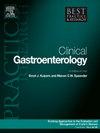Early diagnosis of gastric cancer: Endoscopy and artificial intelligence
IF 3.2
3区 医学
Q2 GASTROENTEROLOGY & HEPATOLOGY
Best Practice & Research Clinical Gastroenterology
Pub Date : 2025-03-01
DOI:10.1016/j.bpg.2025.101979
引用次数: 0
Abstract
Early diagnosis of gastric cancer enables effective, minimally invasive and organ-sparing treatment throughout endoscopic resection. This technique offers low rates of adverse events, improved quality of life compared to surgery, and excellent disease-free survival when curative criteria are met.
Upper gastrointestinal endoscopy with biopsies is the gold standard for diagnosing either pre-malignant conditions or gastric cancer but high-quality endoscopy is paramount to avoid missing lesions. Also, adequate endoscopic assessment of a gastric lesion is crucial to select patients for endoscopic resection and remains the best predictor for curative resection. However, curative resection rates have been stable at around 80–85 % in recent years, so there is room for improvement in patient/lesion selection for endoscopic resection.
This review intends to address strategies that can be pursued to optimize upper gastrointestinal endoscopy quality, improve gastric lesion detection and characterization, and unveil how Artificial Intelligence can contribute to this process in the near future.
胃癌早期诊断:内镜与人工智能
胃癌的早期诊断可以在整个内镜切除过程中实现有效、微创和保留器官的治疗。与手术相比,该技术的不良事件发生率低,生活质量提高,当满足治疗标准时,无病生存期很好。上消化道内窥镜活检是诊断癌前病变或胃癌的金标准,但高质量的内窥镜检查对于避免遗漏病变至关重要。此外,对胃病变进行充分的内镜评估对于选择内镜切除的患者至关重要,并且仍然是治疗性切除的最佳预测指标。然而,近年来治愈率稳定在80 - 85%左右,因此内镜下切除的患者/病变选择仍有提高的空间。本文旨在探讨优化上消化道内窥镜检查质量、提高胃病变检测和表征的策略,并揭示人工智能在不久的将来如何在这一过程中发挥作用。
本文章由计算机程序翻译,如有差异,请以英文原文为准。
求助全文
约1分钟内获得全文
求助全文
来源期刊
CiteScore
5.50
自引率
0.00%
发文量
23
审稿时长
69 days
期刊介绍:
Each topic-based issue of Best Practice & Research Clinical Gastroenterology will provide a comprehensive review of current clinical practice and thinking within the specialty of gastroenterology.

 求助内容:
求助内容: 应助结果提醒方式:
应助结果提醒方式:


